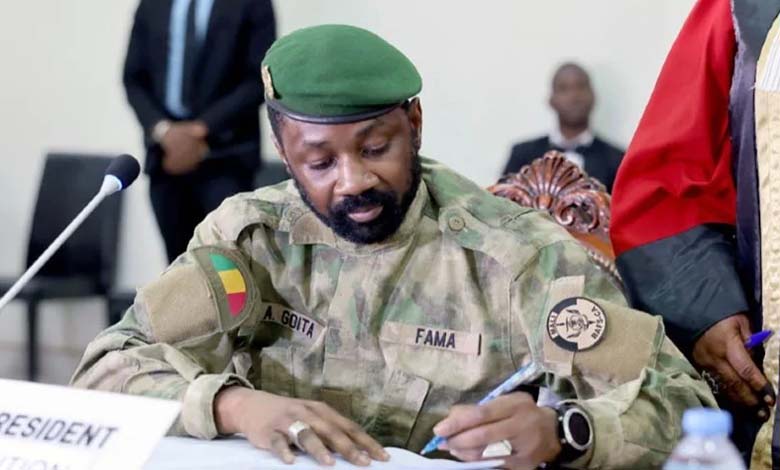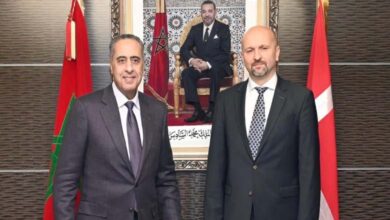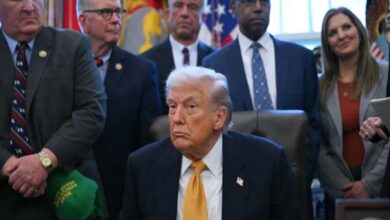Party Life in Mali… Course Correction or End of an Era?

Mali stands at a crossroads after the transitional authorities expressed their intention to reduce the number of political parties or even dissolve them entirely, posing a threat to the multiparty system.
Political experts say the country may be on the verge of a new phase that closes the chapter on political pluralism — a move some see as the end of a democratic process that began with the 1991 revolution.
-
Algerian Interest in News of Mali’s Tuaregs Reflects Bias toward Separatists
-
Wagner forces involved in Mali battles were stationed in Libya
Is the transitional phase undermining democratic gains? And what are the motives behind this direction?
Mali’s transitional authorities, led by Assimi Goïta, have announced the launch of consultations with so-called “living forces of the nation” to reassess the political landscape. This may result in a reduction in the number of political parties or even their complete dissolution.
Laurent Clément, a French researcher at the African Political Studies Center in Paris, commented saying, “What is happening in Mali signals a return to authoritarianism wrapped in populist rhetoric.”
-
Malian Army and Allies Use Drones in Attack Against Tuaregs
-
Al-Qaeda Claims Responsibility for Deaths of Dozens of Wagner Members in Mali
He added, “When transitional regimes speak of political reform without a clear legal framework or international oversight, they often aim to eliminate their political rivals.” He emphasized, “Dissolving parties doesn’t reform democracy — it dismantles it.”
continued, “Legitimacy is built by broadening participation, not restricting it. In Mali’s case, any reduction in the number of parties should come through legal reform within parliament, not through exceptional transitional decisions.”
He argued that reducing or dissolving parties is not merely a political adjustment, but a fundamental threat to the spirit of democracy that has prevailed since 1991: “This is an attempt to dismantle the pluralistic system that has served as a safeguard against authoritarianism.”
-
Mali: ‘Wagner’ Suffers Defeat in ‘African-Style’ Combat
-
After shifting its weight to Africa, could Somali Abdulkadir Mumin become the next leader of ISIS?
Clément warned of the motives behind the move: “The declared justifications are based on the weakness of party performance and public distrust, but in reality, the transitional authorities are exploiting the political vacuum to reshape the system to suit themselves — without party or institutional oversight. It’s a sensitive stage, and if not handled transparently, it could lead to a soft coup against democratic achievements in the name of ‘reform’.”
He stressed, “Democracy is not about the number of parties, but about real pluralism and a balance between power and society.”
Meanwhile, Hamadi Diarra, a Malian researcher at the Center for Strategic Studies in Bamako, said that “parties also bear part of the blame, as many failed to present realistic programs or maintain grassroots connections.”
-
Warnings of Escalating Terrorism in Mali After European Troops Withdraw
-
Somalia’s “Danab” Unit: From Counterterrorism to Accusations of Theft
He added that the lack of transparency and widespread corruption among the political elite provided justification for the transitional authority’s escalation, but argued that the solution is not total cancellation, but legal reform of party formation and funding monitoring — to safeguard pluralism and ensure fair representation.
This announcement sparked wide controversy in political circles, especially since party life in Mali is considered one of the key achievements of the country’s democratic experience following the ousting of General Moussa Traoré in 1991.
At that time, associations were allowed to evolve into political parties, marking the birth of a new era of pluralism.
-
Mauritania faces a wave of refugees as conflict in mali intensifies
-
Situations Worsen in Mali… What’s Happening in the African Country?
Nouhoum Togo, head of the USR party and a leading figure in Mali’s democratic movement, recalls that moment: “We started by forming political associations like CNID Faso Yiriwa Ton and the Adema Association, which fought alongside youth, especially students. These associations later became real parties, which led to the election of Mali’s first democratically chosen president, Alpha Oumar Konaré, in 1992.”
But nearly three decades later, Mali has experienced two military coups (in 2012 and 2020), which have severely destabilized its political and security landscape and plunged the country into one of its most complex crises.
-
Compensation for African Union mission victims in Somalia with a stay of execution
-
Fighting terrorism and drought… the most prominent files of the President of Somalia at the United Nations
Is Democracy the Victim?
A portion of the Malian population believes that political parties have failed to fulfill their aspirations and have become a burden rather than a driving force for development and justice.
This perception has partly been adopted by the transitional government, which decided in April 2024 to suspend party activity for three months. Now, according to the French magazine Jeune Afrique, it is considering more drastic steps.
Sidi Touré, communications officer for the Parena party led by former foreign minister Tiébilé Dramé, expressed pessimism about the future of parties: “The performance of parties can be assessed based on their electoral participation and the number of representatives in parliament or local councils… But basing decisions on consultations with the ‘living forces’ seems like a predetermined outcome. The real aim is the complete dissolution of parties.”
-
What does Iran want from Mali? Details
-
Who is the “mysterious imam” who supported the Malian president and helped to overthrow him?
-
How Ag Ghali Went from Singer to One of Al-Qaeda’s Most Dangerous Leaders in West Africa?
-
With Weapons and Soldiers, the Russian Bear Strengthens Its Influence in the African Sahel












